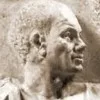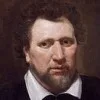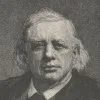And yet what harm can there be
in presenting the truth with a laugh, as teachers sometimes give
their children biscuits to coax them into learning their ABC?[Quamquam ridentem dicere verum
quid vetat? ut pueris olim dant crustula blandi
doctores, elementa velint ut discere prima.]Horace (65-8 BC) Roman poet, satirist, soldier, politician [Quintus Horatius Flaccus]
Satires [Saturae, Sermones], Book 1, # 1, “Qui fit, Mæcenas,” l. 24ff (1.1.24-26) (35 BC) [tr. Rudd (2005 ed.)]
(Source)
(Source (Latin)). Alternate translations:Toyes may kepe and staye
Sumtimes the reeder very well, as those that teache in schooles,
With buttred bread, or featusse knacks will lewre the little fooles,
To learne a pace theyr A. B. C.
[tr. Drant (1567)]Though to blurt out a truth has never been
(In way of merriment) esteem'd a sin.
The flattering Master thus his Boys presents
With Cakes, to make them learn their Rudiments.
[tr. A. B.; ed. Brome (1666)]And mirth commends, and makes our Precepts take,
Thus Teachers bribe their Boys with Figs and Cake
To mind their books.
[tr. Creech (1684)]Yet may not truth in laughing guise be drest?
As masters fondly sooth their boys to read
With cakes and sweetmeats.
[tr. Francis (1747)]Albeit why may not truth in smiles be drest,
As gentle teachers lure the child to come
And learn his horn-book, with a sugar plum?
[tr. Howes (1845)]Though what hinders one being merry, while telling the truth? as good-natured teachers at first give cakes to their boys, that they may be willing to learn their first rudiments.
[tr. Smart/Buckley (1853)]Although what does prevent one telling truth in playful mood, as often tutors give their pupils cakes caressingly, to make them care to learn their ABC?
[tr. Millington (1870)]Though, for me,
Why truth may not be gay, I cannot see:
Just as, we know, judicious teachers coax
With sugar-plum or cake their little folks
To learn their alphabet.
[tr. Conington (1874)]What is to prevent one from telling truth as he laughs, even as teachers sometimes give cookies to children to coax them into learning their A B C?
[tr. Fairclough (Loeb) (1926)]And yet -- there’s no law against telling the truth with a smile.
Smart teachers, for instance, give crunchy sweets to children
To make them learn their letters.
[tr. Palmer Bovie (1959)]But tell me what law is violated if someone laughs
while speaking truth? You know how teachers sometimes give
their pupils little cakes, to help them learn their ABC’s.
[tr. Fuchs (1977)]Though why can’t one tell the truth
With a smile? Teachers coax children to love
Learning by giving them cookies.
[tr. Raffel (1983)]Although what's there to forbid one who is laughing,
from telling the truth? As loving teachers sometimes
hand out sweets to their pupils
so that they'll want to learn their ABC's.
[tr. Alexander (1999)]Though what bars us
from telling truths with a laugh, the way teachers
sow cookies and reap memorized alphabets?
[tr. Matthews (2002)]Though what stops one telling the truth
While smiling, as teachers often give children biscuits
To try and tempt them to learn their alphabet?
[tr. Kline (2015)]
Quotations about:
mirth
Note not all quotations have been tagged, so Search may find additional quotes on this topic.
They that love Mirth, let them heartily Drink,
‘Tis the only Receipt to make Sorrow sink.Ben Jonson (1572-1637) English playwright and poet
“Private Entertainment of the King and Queen,” Highgate, London (1604-05-01)
(Source)
Receipt and recipe (both from the Latin recipe "you take this!") were originally used in English for medical formulations and prescriptions. "Receipt" was often abbreviated "Rt," which, as a ligature, looks like "℞" or "Rx" -- which is still used as an abbreviation a medical prescription.
And know, reader, that an ounce of mirth, with the same degree of grace, will serve God farther than a pound of sadness.
Thomas Fuller (1608-1661) English churchman, historian
The History of the Worthies of England, “Worthies of Hertfordshire,” “Writers” (1662)
(Source)
Writing of Jeremiah Dike. By the late 19th Century, Fuller's comment had been paraphrased into something simpler, though still attributed to him:An ounce of cheerfulness is worth a pound of sadness to serve God with.
[Source 1872, 1895, 1867]
This sentiment is not unique to Fuller. In Richard Baxter's A Treatise of Self-Denial (1659), in "A Dialog of Self-Denial" between Flesh and Spirit, Flesh says:Why should I think of what will be tomorrow?
An ounce of mirth is worth a pound of sorrow.
The second line here may have been a common English aphorism prior to Fuller and Baxter.
I have observed that in comedies the best actor plays the droll, while some scrub rogue is made the fine gentleman or hero. Thus it is in the farce of life. Wise men spend their time in mirth, ’tis only fools who are serious.
I have always preferred cheerfulness to mirth. The latter I consider as an act, the former as an habit of mind. Mirth is short and transient, cheerfulness fixed and permanent. Those are often raised into the greatest transports of mirth who are subject to the greatest depressions of melancholy. On the contrary, cheerfulness, though it does not give the mind such an exquisite gladness, prevents us from falling into any depths of sorrow. Mirth is like a flash of lightning, that breaks through a gloom of clouds, and glitters for a moment; cheerfulness keeps up a kind of daylight in the mind, and fills it with a steady and perpetual serenity.
Joseph Addison (1672-1719) English essayist, poet, statesman
Essay (1712-05-17), The Spectator, No. 381
(Source)
A man without mirth is like a waggon without springs, in which one is caused disagreeably to jolt by every pebble over which it runs. A man with mirth is like a chariot with springs, in which one can ride over the roughest road, and scarcely feel anything but a pleasant rocking motion.
Henry Ward Beecher (1813-1887) American clergyman and orator
Royal Truths (1862)
(Source)
Frequently rendered, but unsourced in this form:A person without a sense of humor is like a wagon without springs. It's jolted by every pebble on the road.
In Proverbs from Plymouth Pulpit, "The Human Mind" [ed. Drysdale (1887)], Beecher is recorded similarly saying:A practical, matter-of-fact man is like a wagon without springs: every single pebble on the road jolts him; but a man with imagination has springs that break the jar and jolt.
The best doctors in the world are Doctor Diet, Doctor Quiet, and Doctor Merryman.
Mirth is God’s medicine. Everybody ought to bathe in it. Grim care, moroseness, anxiety — all this rust of life ought to be scoured off by the oil of mirth. It is better than emery. Every man ought to rub himself with it.
Good friends, my Readers, who peruse this Book,
Be not offended, whilst on it you look:
Denude yourself of all depraved affection,
For it contains no badness, nor infection:
‘Tis true that it brings forth to you no birth
Of any value, but in point of mirth;
Thinking therefore how sorrow might your mind
Consume, I could no apter subject find:
One inch of joy surmounts of grief a span;
Because to laugh is proper to the man.[Amis lecteurs qui ce livre lisez,
Despouillez vous de toute affection.
Et le lisants ne vous scandalisez,
Il ne contient mal ne infection.
Vray est qu’icy peu de perfection
Vous apprendrez, si non en cas de rire.
Aultre argument ne peut mon cueur elire.
Voiant le dueil qui vous mine & consomme,
Mieulx est de ris que de larmes escrire,
Pour ce que rire est le propre de l’homme.
VIVEZ IOYEUX]François Rabelais (1494-1553) French writer, humanist, doctor
Gargantua and Pantagruel, “To the Readers” (1534-1542) [tr Urquhart/Motteux (1653)]
(Source)
The work was deemed obscene by the censors of the Collège de la Sorbonne.
(Source (French)). Alternate translations:My kindly Readers, who this Book begin,
All Prejudice, I pray you, lay aside,
And reading it, find no Offence therein;
In it nor Hurt nor Poison doth abide.
'Tis true that small Perfection here doth hide;
Nought will you learn save only Mirth's Delight;
No other Subject can my Heart indite,
Seeing the Dole that wastes and makes you wan;
'Tis better far of Mirth than Tears to write,
For Laughter is the special Gift to Man.
LIVE MERRILY
[tr. Smith (1893)]Kind readers, who vouchsafe to cast an eye
On what ensues, all prejudice lay by:
Let not my book your indignation raise;
It means no harm, no poison it conveys.
Except in point of laughing, it is true
Not much 'twill teach you -- it being all my view
To inspire with mirth the hearts of those that moan,
And change to laughter the afflictive groan,
FOR LAUGHTER IS MAN'S PROPERTY ALONE.
[tr. Urguhart/Motteux/Stokes (1905)]Readers, friends, if you turn these pages
Put your prejudice aside,
For, really, there's nothing here that's outrageous,
Nothing sick, or bad -- or contagious.
Not that I sit here glowing with pride
For my book: all you'll find is laughter:
That's all the glory my heart is after,
Seeing how sorrow eats you, defeats you.
I'd rather write about laughing than crying,
For laughter makes men human, and courageous.
BE HAPPY!
[tr. Raffel (1989)]You friends and readers of this book, take heed:
Pray put all perturbation far behind,
And do not be offended as you read:
It holds no evil to corrupt the mind;
Though here perfection may be hard to find,
Unless in point of laughter and good cheer;
No other subject can my heart hold dear,
Seeing the grief that robs you of your rest:
Better a laugh to write of than a tear,
For it is laughter that becomes man best.
[tr. Frame (1991)]
Cheerfulness keeps up a kind of daylight in the mind, and fills it with a steady and perpetual serenity.
Joseph Addison (1672-1719) English essayist, poet, statesman
Essay (1712-05-17), The Spectator, No. 381
(Source)
MESSENGER: Frame your mind to mirth and merriment,
Which bars a thousand harms, and lengthens life.William Shakespeare (1564-1616) English dramatist and poet
Taming of the Shrew, Induction, sc. 2, l. 137ff (c. 1591)
(Source)









